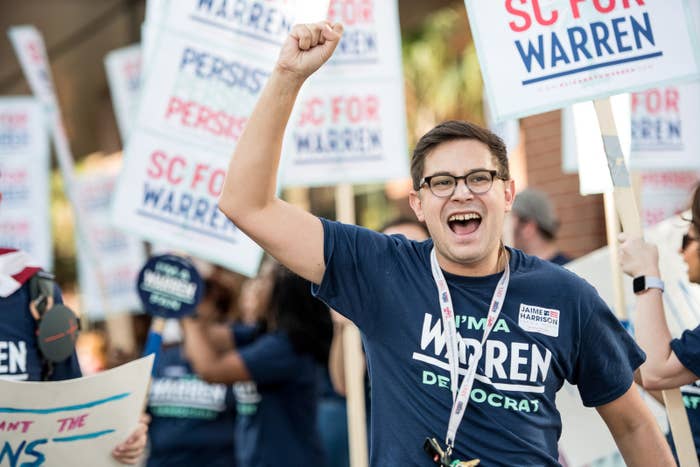
You won’t hear Elizabeth Warren say it, but allies at a national progressive group working closely with her campaign will: Joe Biden supporters “are ready to bolt.”
That’s part of the premise behind a new effort by the Progressive Change Campaign Committee, launched Monday morning, to highlight and collect information from Democratic primary voters who previously supported another candidate or identified as undecided, but made the move to Warren after seeing her “in action” on the trail.
Adam Green, cofounder of the PCCC, a Washington, DC–based organization that has partnered with Warren since she entered politics as a 2012 Senate candidate, said that their “Switch to Warren” push will focus in large part on Biden supporters concerned most about nominating the candidate best positioned to defeat President Trump.
“They don’t need an excuse,” Green said of Biden voters, citing Warren’s recent rise in the polls. “The moment they get a sense that he’s not the best to go against Trump, they won’t need any further permission to leave Biden for somebody else.”
“These people are ready to bolt.”
In a field of more than 20 candidates, the former vice president leads early polls with support from nearly a third of Democrats. Over the last month, as she’s managed to command media attention and capture audiences, Warren is now polling alongside Bernie Sanders and Pete Buttigieg in the tier of candidates just behind Biden.
“People think Warren’s challenge is how to take a bunch of Bernie supporters,” Green said of the other leading progressive in the race. “The two big honeypots for Warren are actually Biden supporters and undecided voters, all of whom are electability voters looking to go with somebody who can inspire voters in the general election.”
The Switch to Warren effort, which asks newly converted supporters to detail their reasons for changing their minds, will make the case that primary voters have been surprised by the Warren they meet on the trail: Where the public might know her as a Harvard professor, or “a wonk,” said Green, they hear her talk at campaign events about growing up working class in Oklahoma, or struggling as a single mother, or working in bankruptcy law on the same issues that now inform her campaign policy proposals.
But the new project is also a sign that the group is willing to use its membership of nearly 1 million people to challenge Biden and the widely held perception that he’d be the safest choice in a general election.
So far, Green said, they’ve collected testimonials from voters who have switched to Warren from Biden and Sanders both in states like Ohio, Georgia, and California.
In Warren’s political orbit, the PCCC occupies a place on the close periphery — enough on the inside to work in lockstep with her aims, enough on the outside to amplify her causes, promote her name, and pressure her rivals with a more aggressive posture than Warren herself would take.
In 2013, when a new wave of progressive energy began to sweep over the Democratic Party, it blanketed social media with a new slogan, “I’m From the Elizabeth Warren Wing of the Party,” to brand it in her name. In 2016, while she worked behind the scenes to push her policy agenda with Hillary Clinton’s campaign, it was there to do the same in public. And in 2019, as she set herself apart from a growing field of presidential candidates by vowing to abstain from high-dollar fundraisers, it loudly pressed others to do the same, helping Warren define the terms of the primary in her own progressive image.
The group, which endorsed Warren on the first day of her presidential bid on New Year’s, works in coordination with the campaign, Green said, “to utilize our biggest resource, our membership, and argue for the rationale of Warren’s candidacy.”
The candidate, meanwhile, has little to say about polling or her strategy as it pertains to the rest of the primary field.
“It’s way too early to talk about polls,” she said earlier this month when a reporter tried to ask in South Carolina.
“I get a chance to talk about what’s broken in America, how we can fix it, and build a grassroots movement to get that done. And I get to do it every day.”
